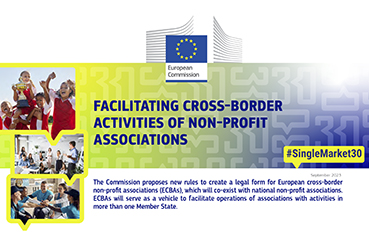The European Commission has adopted a proposal to facilitate cross-border activities of non-profit associations in the EU. It will improve the functioning of the Internal Market by removing legal and administrative barriers for non-profit associations that operate or wish to operate in more than one Member State, thus promoting the role non-profit associations play in generating economic and societal values in the EU and allow a level playing field between them.
Currently, when non-profit associations engage in activities in another Member State than the one they are established in, they do not receive uniform acknowledgment of their legal personality and capacity and often need to register for a second time or even form a new legal entity in that Member State.
About 310 000 non-profit associations currently affected by those obstacles when operating in another country are estimated to reduce administrative costs with the new rules by up to EUR 770 million per year, potentially amounting up to EUR 8.5 billion within the time frame of 15-years. Moreover, about another 185 000 non-profit associations are potentially expected to engage in cross-border activities, if the identified barriers tackled by the proposal are removed, and could generate up to EUR 4.2 billion added value over a 15-year period.
The Commission’s proposal introduces an additional legal form of a European cross-border association (ECBA) in Member States’ national legal systems, which is specifically designed for cross-border purposes and will reduce legal and administrative burden when it comes to the recognition and establishment of non-profit associations engaging in activities in another Member State.
Once established in one Member State, an ECBA will be recognised automatically and will be able to engage in activities in all Member States, including economic activities, thereby allowing non-profit associations to unleash their full societal and economic potential in the EU. ECBAs will co-exist alongside with other national associations at Member State level.
The European Commission ensures that ECBA will fully enjoy the benefits of the Internal Market regardless of the Member State of registration by having free and non-discriminatory access to public funding in each Member State it operates.
Next Steps
The proposal will be presented to the European Parliament and the Council for approval. Once adopted, Member States will have two years to transpose the Directive into national law.
Background
Non-profit associations create economic and societal value across the Union and conduct activities in key sectors such as health, care and social services, culture, employment services, sports, research and development and education. 3.8 million non-profit associations exist in EU Member States contributing 2.9% of EU GDP.
Acknowledging the need to create an enabling environment for the non-profit sector, the proposal stems from the European Parliament resolution with recommendations to the Commission on a statute for European cross-border associations and non-profit organisations adopted on 17 February 2022.
The proposal is embedded in the broader political objectives of the European Green Deal and the Digital Decade 2030 and embraces the political priority for an economy that works for people. The proposal contributes to the objectives of the Action Plan for the Social Economy and is linked to some of its actions, such as the proposal for a Council Recommendation on developing social economy framework conditions in the Member States.
For More Information







